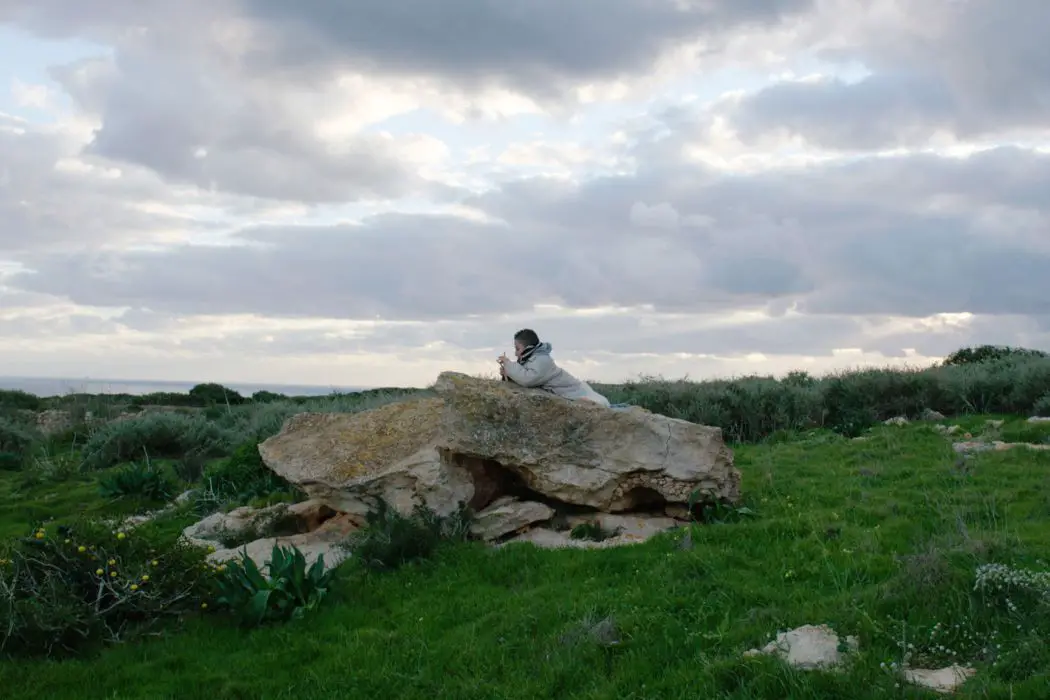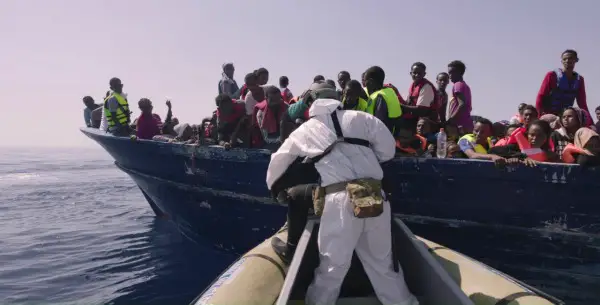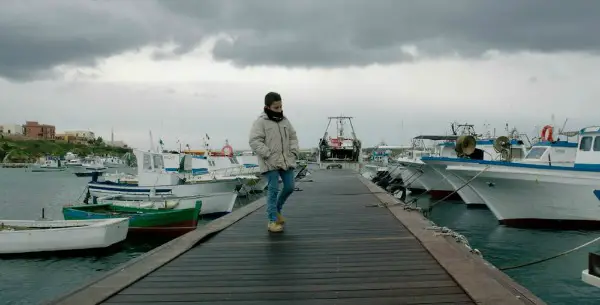FIRE AT SEA: A Film That Will Set Your Heart On Fire

Christopher Connor completed his B.A. in Film and Media Studies…
On a quiet Italian island, far from mainland Italy, a young boy, Samuele, methodically breaks off branches from a tree to create a sling shot. He’s alone, seemingly undisturbed by the world around him.
A searchlight scans the dark blue waters of the Mediterranean Sea. A desperate cry for help crackles over a radio. There are 250 passengers on a sinking boat, and they need help immediately. The Italian navy and the migrants try to communicate in broken English.
The following day, Zia Maria quietly cooks in her kitchen. She’s listening to the radio. The announcer reports that 250 refugees drowned on their way to Lampedusa, in search for a better life. It’s an occurrence the people in Lampedusa are far too familiar with. It’s a common tragedy for the ones desperate enough to make the journey.
A Haunting, Lyrical Exploration of Two Worlds
Fire at Sea (Fuocoammare) navigates between both of these worlds, telling two stories at once: the life of the migrants and the life of the people on the island they’re trying to reach. You’d expect these stories to intertwine more dramatically than they do. But, in reality, they don’t. There is not one moment where the average citizen of Lampedusa interacts with a migrant. The refugees simply brush past the people of Lampedusa – as if ghosts – processed somewhere out of sight, and then subsequently sent away. It’s a drastic contrast. How can something so heartbreaking and disturbing exist right against the quotidian life of a simple fishing village?

Gianfranco Rosi’s film, which is nominated for an Oscar for Best Documentary Feature, is not the type of documentary that overwhelms you with information. Only at the opening of the movie do we get title cards, stating that in the last 20 years, 400,000 migrants have attempted the perilous journey, and at least 15,000 have died. Rosi takes his time, letting the images tell the story at its own pace. This refusal to use narration or any sort of music to manipulate our mood, forces us to really engage with the images and ideas before us.
As the director mentioned at a screening of Fire at Sea at the in Los Angeles, California, he wanted to use the language of cinema to tell the story. He didn’t want to go the typical documentary route. We see this through beautiful, breathtaking long shots of Lampedusa and its vast views of the sea. We see it as the camera lingers over the faces of those traumatized by the journey. It’s as haunting as it is poetic and lyrical.
The Refugees
Despite what you might expect, Fire at Sea doesn’t contain an overwhelming amount of refugee footage. But the ones that Rosi does show hit you hard. He presents the viewers images of pure desperation. We see the unimaginable images of the dead bodies of those stuck in the lower hold of a ship, having suffocated from the gas fumes and heat. It’s a scene from a real life horror movie.
There’s a striking moment when a woman asks if the rescuers have taken all the black men off their boat. When she realizes that someone she knows is dead, she closes her eyes. You can literally see the loss wash over her.

One of most emotional parts of the movie is when a group of Africans kept in a holding center pray, sing, and chant about their escape from their homelands. One man sings about crossing the Sahara Desert, of fleeing ISIS, of being locked away in Libyan prisons. He sings about the people that died in those prisons, of the ones that didn’t make it through the desert. Yet, those that survived pushed on, into the sea towards Lampedusa. More people died, and many were saved. It’s an expression of pure sorrow and joy inextricably linked together. It’s the story of their exodus.
The People of Lampedusa
Often, when we hear of Lampedusa, it’s always a story of unspeakable tragedy, of the refugees that die trying to cross over. We never get to see the inhabitants of the island itself. So, one of Rosi’s goals was to not only humanize those that suffer the attempt across the Mediterranean, but to also introduce us to the slow, everyday life of some people on the island.
One character we spend the most time with is Samuele. He resembles a slightly older Bruno from Bicycle Thieves. There’s an awareness about him that makes him feel wise beyond his years. He holds himself to be much older than he is, an incredibly smart and articulate kid.

In one intimate moment with Samuele, we see him at the doctor’s office for a regular check up. It’s here that we get a sense that maybe the real world does seep into the lives of those on the island. Samuele speaks of having an anxiety that he can’t really place. And the doctor confirms these suspicions. There’s nothing actually wrong with him, except this anxiety that makes breathing for Samuele difficult.
Because most people of the island never come into contact with the refugees, we wonder if the disconnection makes the crisis abstract for them. Would there be a greater sense of urgency if they were all forced to interact? It’s a fair question to ask, and one that makes us question our own distance from the events. How do we deal with these tragedies that seem so far away from our actual everyday lives?
But not all the citizens of Lampedusa live a life separate from the migrant crisis. One doctor has placed himself in the midst of it for years, and admittedly, it’s taken a toll on him. In the closest scene we get to a formal interview, Dr. Pietro Bartolo describes the work he’s been doing to assist the migrants as they land on the island. He details the horrible things he’s seen, and the nightmares that’ve plagued him ever since. He explains that once you see dead pregnant women and children, those images never leave you.
And, without mincing any words, he states: “If you’re human, you must help these people.”
Do you agree with Dr. Pietro Bartolo? What are some other films that highlight the international migrant crisis? Discuss in the comments!
Fire at Sea opened at various festivals throughout 2016 and is currently available in limited theatrical release world wide. For a list of release dates, see here.
Does content like this matter to you?
Become a Member and support film journalism. Unlock access to all of Film Inquiry`s great articles. Join a community of like-minded readers who are passionate about cinema - get access to our private members Network, give back to independent filmmakers, and more.
Christopher Connor completed his B.A. in Film and Media Studies and his minor in Italian Studies at UCSB. While in school, he won several awards and scholarships for his screenplays and academic writing. They include the Paul N. and Elinor T. Lazarus Scholarship, the Dorothy and Sherrill C. Corwin Award, and the Alexander Sesonske Prize, among several others. If he’s not busy writing, he enjoys reading, watching films, and eating lots of vegan pizza.












